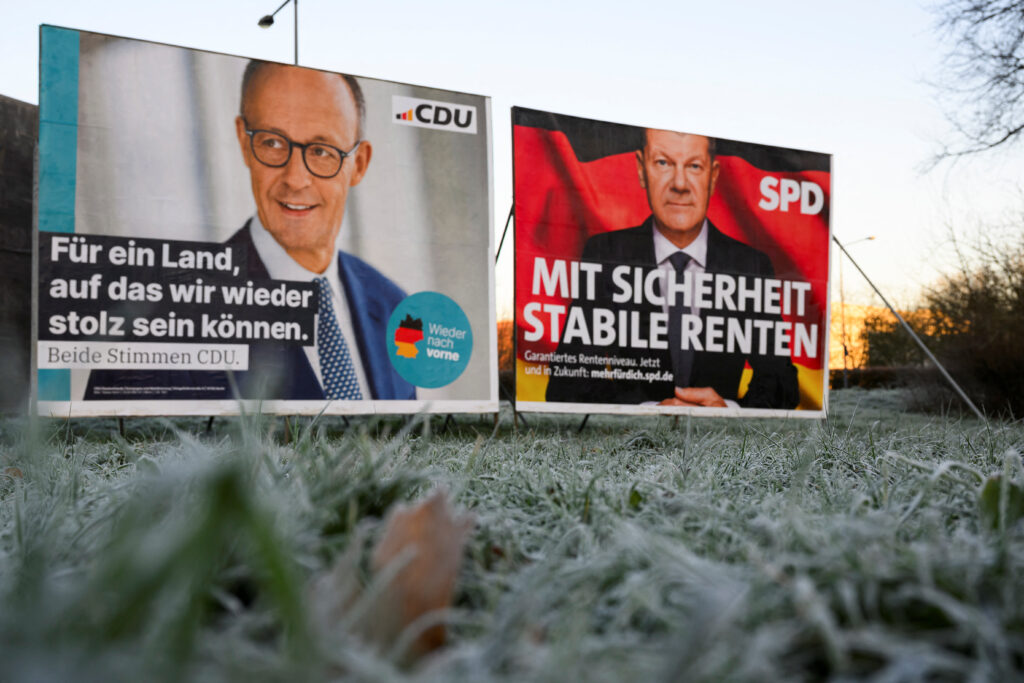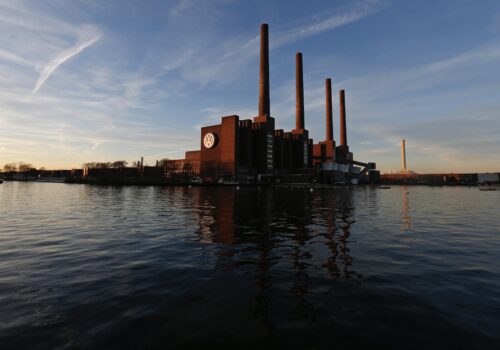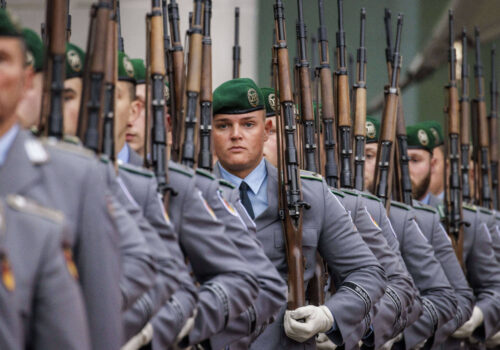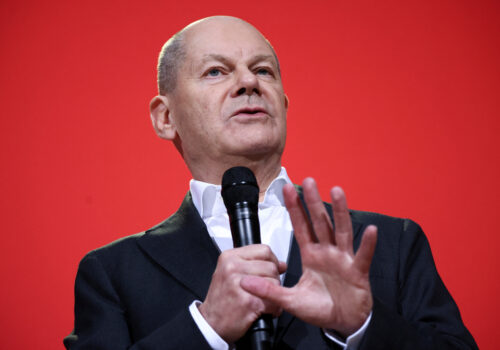In November 2024, the government of German Chancellor Olaf Scholz collapsed. In 2021, his center-left Social Democrats had formed a three-party coalition with the Free Democrats (FDP) and the Greens. Just three years into their term, however, deep divisions over fiscal policy and spending priorities culminated in Scholz firing his finance minister (and FDP leader) Christian Lindner. This ultimately resulted in a no-confidence vote that the chancellor lost, triggering snap elections on February 23. And so the “Fortschrittskoalition”—elected on the promise of a post-Angela-Merkel Germany that would drive the green transition forward and revitalize the economy—comes to an end, as Berlin faces unprecedented challenges, from the war in Ukraine to Germany’s role in the age of the “Zeitenwende” and the need to reduce economic dependence on China.
All of these issues and more are at stake as Germans elect new leadership for Europe’s largest economy. Ahead of the election, Europe Center experts break down the key issues, players, and trends to watch this weekend.
What does the Bundestag look like currently?
Who is Germany’s presumptive next chancellor, Friedrich Merz, and what is his track record?
Friedrich Merz emerged on the political stage in the 1990s, first as a member of the European Parliament until 1994, then as a Bundestag member until 2009. He briefly served as chairman of the Christian Democratic Union/Christian Social Union (CDU/CSU) parliamentary group in 2000, but was sidelined under Merkel‘s leadership and pivoted to the private sector, working as a corporate lawyer and heading the supervisory board of the German branch of BlackRock until 2018. Throughout this period, he maintained his diplomatic influence—and his international and transatlantic ties—as chairman of Atlantik-Brücke, a non-profit association promoting German-American understanding and cooperation. Merz stepped back into the political fray in Berlin as a challenger for Merkel’s succession in 2018, only to be beaten by then-CDU leader Annegret Kramp-Karrenbauer. He was eventually selected to lead the CDU in 2022.
Given his track record, the presumptive next chancellor is likely to prioritize Germany’s fiscal discipline at home, with implementing strict budget cuts—for example, by restructuring the country’s “Bürgergeld”—while projecting German strength abroad to counterparts on the European and international stage. This approach was evident in a recent TV debate, in which he asserted with the other candidates: “We are not neutral. We do not stand in the middle. We are on the side of Ukraine and, with Ukraine, we defend the political order we have here.”
— Stuart Jones is a program assistant in the Atlantic Council’s Europe Center.
What are the key issues for voters, and how does Russia’s war in Ukraine factor in?
Click on a picture above to read more.
What has driven the rising support for the far-right AfD?
Over the last decade, the Overton window in Germany has shifted, just as it has in the United States. The AfD, founded in 2013, was once considered a fringe political party, but in recent years, it has gained significant traction. Today, it’s on the verge of its strongest national showing yet, likely coming in second behind the CDU/CSU. Part of this success stems from the fact that the AfD has adopted a playbook similar to that of the New Right in the United States. The messages it promotes to the German public prey on the same grievances: illegal immigration, government overreach, and culture wars, among others.
— Rachel Rizzo is a nonresident senior fellow with the Atlantic Council’s Europe Center.
Does the AfD stand a chance of joining the governing coalition?
No. All of the major parties in this election have been very clear about excluding the AfD from any coalition to form a government. The “remigration” plan, outlined in a secret Potsdam retreat of some AfD leaders in November 2023, sparked widespread anti-Nazi protests across Germany and led the country’s mainstream parties to distance themselves from the far-right outfit as far as possible. This sentiment largely remains intact in 2025. While the AfD continues to be considered taboo for its advocacy of a “master plan” for mass deportations of migrants and asylum-seekers, the CDU’s recent use of AfD votes to pass a non-binding resolution on stricter migration rules has caused political outrage and nationwide protests. Fears persist that a CDU-led government, even without the AfD in coalition, could still rely on the party’s support in the Bundestag.
— Stuart Jones
Although the “Brandmauer” will hold, meaning the AfD won’t be part of a governing coalition, it will be difficult to completely ignore a party that will likely secure over 20 percent of the German vote. That’s where the rubber hits the road: Will the next German chancellor and his coalition be able to reclaim key narratives from the AfD, or will the AfD be able to continue pulling German society further to the right?
— Rachel Rizzo
What should allies across Europe and the Atlantic watch out for?
The AfD, poised for a strong performance this year, will dominate international headlines. While the CDU remains the front-runner, the prospective rise of the far-right party—classified by Germany’s intelligence agency as an “extremist group”—would mark a historic shift in postwar Germany’s electoral balance. Outcomes at the extremes, including the AfD, leftwing parties like Die Linke and the Sarah Wagenknecht Alliance (BSW), and the FDP, which is hovering around the 5 percent threshold, could yield enough seats to form a one-third blocking minority, scattering ambitions for much-needed fiscal reforms. Last-minute gains from Die Linke, combined with a significant share of undecided voters, will determine whether Berlin is headed for a two- or three-way coalition government.
Europe is looking to Berlin to regain its leadership role, overcoming divisions that are bleeding into Brussels’s policymaking at a critical time. Confronted with complicated domestic fiscal and EU budget negotiations, imminent trade negotiations with Washington, decisive defense support for Ukraine, and far-reaching reforms on Europe’s competitiveness, immigration, and tech regulations, the next German government will face critical decisions. High on the agenda, the future chancellor will have to reinvigorate Franco-German partnership, which is crucial for shaping the continent’s defense policy in light of dwindling US security commitments.
— Jacopo Pastorelli is a program assistant with the Atlantic Council’s Europe Center.
Further reading

The Europe Center promotes leadership, strategies, and analysis to ensure a strong, ambitious, and forward-looking transatlantic relationship.
Image: Election campaign posters for Friedrich Merz of Christian Democratic Union (CDU) and German Chancellor Olaf Scholz of Social Democratic Party Germany (SPD) are pictured ahead of the upcoming general election, in Cologne, Germany, February 2, 2025. REUTERS/Jana Rodenbusch



